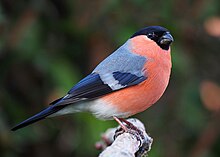Pyrrhula
| Bullfinches | |
|---|---|

| |
| Eurasian bullfinch, Pyrrhula pyrrhula | |
| Scientific classification | |
| Kingdom: | Animalia |
| Phylum: | Chordata |
| Class: | Aves |
| Order: | Passeriformes |
| Family: | Fringillidae |
| Subfamily: | Carduelinae |
| Genus: | Pyrrhula Brisson, 1760 |
| Type species | |
| Pyrrhula pyrrhula | |
| Species | |
|
See text. | |
Pyrrhula is a small genus of passerine birds, commonly called bullfinches, belonging to the finch family (Fringillidae). The genus has a Palearctic distribution; almost all species occur in Asia, with two species exclusively in the Himalayas and one species, P. pyrrhula, also occurring in Europe. The Azores bullfinch (P. murina) is a critically endangered species (about 120 pairs remaining), occurring only in the east of the island of São Miguel in the Azores archipelago.
Analysis of the mtDNA cytochrome b sequence indicates that the Holarctic pine grosbeak (Pinicola enucleator) is the closest living relative of this genus. Arguably, it could be included in Pyrrhula, but more probably is a distinct offshoot of a common ancestor, with the pine grosbeak as the sister group to the ancestor of the bullfinches.[1][2] The evolution of the bullfinch species started soon after the pine grosbeak's ancestors diverged from them (at the end of the Middle Miocene, about 12 mya), and it is quite possible that the latter species evolved in North America; what is fairly certain is that the bullfinch radiation started in the general area of the Himalayas. The mountain finches also seem to be part of this clade.[3]
Bullfinches have glossy black wings and tail feathers. They show a white rump. The legs and feet are fleshy brown. Their short, swollen bill is adapted to eat buds, and is black except for the brown bullfinch, which has a grey or greenish-grey bill. The males can be distinguished by their orange or red breast. Some species have a black cap.
Taxonomy[]
The genus Pyrrhula was introduced in 1760 by the French zoologist Mathurin Jacques Brisson.[4][5] The name was derived by tautonymy from the binomial name of the Eurasian bullfinch Loxia pyrrhula introduced by Linnaeus in 1758.[5][6]
The bullfinches in the genus Pyrrhula are sister to the pine grosbeak, the only species placed in the genus Pinicola.[7]
Species[]

There are eight extant and one extinct recognized species in the genus:[8][9]
| Image | Scientific name | Common Name | Distribution |
|---|---|---|---|

|
Pyrrhula aurantiaca | Orange bullfinch | India and Pakistan |
 |
Pyrrhula erythaca | Grey-headed bullfinch | Bhutan, China, India, Myanmar, and Nepal |

|
Pyrrhula owstoni | Taiwan bullfinch (split from P. erythaca)[10] | Taiwan |
 |
Pyrrhula erythrocephala | Red-headed bullfinch | Bhutan, northern India, Nepal |
 |
Pyrrhula leucogenis | White-cheeked bullfinch | the Philippines |
 |
Pyrrhula murina | Azores bullfinch | São Miguel Island, in the Azores archipelago of Macaronesia in the North Atlantic Ocean. |
 |
Pyrrhula nipalensis | Brown bullfinch | Bhutan, China, India, Malaysia, Myanmar, Nepal, Pakistan, Taiwan, and Vietnam. |
 |
Pyrrhula pyrrhula | Eurasian bullfinch | across Europe and temperate Asia. |
- †Greater Azores bullfinch Pyrrhula crassa [11]
References[]
- ^ Arnaiz-Villena, A; et al. (2001). "Phylogeography of crossbills, bullfinches, grosbeaks, and rosefinches". Cellular and Molecular Life Sciences. 58 (8): 1159–1166. doi:10.1007/pl00000930. PMID 11529508. S2CID 6241573.
- ^ Arnaiz-Villena, Antonio; Gomez-Prieto, Pablo; Ruiz-Del-Valle, Valentin (2009). "Phylogeography of Finches and sparrows". In Rechi, Leopold J (ed.). Animal Genetics. Nova Science Publishers. p. 55. ISBN 978-1-60741-844-3.
- ^ Marten, Jill A. & Johnson, Ned K. (1986). "Genetic relationships of North American cardueline finches" (PDF). Condor. 88 (4): 409–420. doi:10.2307/1368266. JSTOR 1368266.
- ^ Brissons, M.J. (1760). Ornithologie, Volume 1. 1. Paris: Chez C.J.-B. Bauche. p. 36.
- ^ a b Paynter, Raymond A. Jnr., ed. (1968). Check-list of birds of the world, Volume 14. 14. Cambridge, Massachusetts: Museum of Comparative Zoology. p. 293.
- ^ Linnaeus, C. (1758). Systema Naturæ per regna tria naturae, secundum classes, ordines, genera, species, cum characteribus, differentiis, synonymis, locis, Volume 1 (in Latin). 1 (10th ed.). Holmiae:Laurentii Salvii. pp. 171–172.
- ^ Zuccon, Dario; Prŷs-Jones, Robert; Rasmussen, Pamela C.; Ericson, Per G.P. (2012). "The phylogenetic relationships and generic limits of finches (Fringillidae)". Molecular Phylogenetics and Evolution. 62 (2): 581–596. doi:10.1016/j.ympev.2011.10.002.
- ^ Gill, Frank; Donsker, David (eds.). "Finches, euphonias". World Bird List Version 5.2. International Ornithologists' Union. Retrieved 5 June 2015.
- ^ "Species Updates – IOC World Bird List". Retrieved 2021-01-12.
- ^ Dong, Feng; Li, Shou-Hsien; Chiu, Chi-Cheng; Dong, Lu; Yao, Cheng-Te; Yang, Xiao-Jun (2020). "Strict allopatric speciation of sky island Pyrrhula erythaca species complex". Molecular Phylogenetics and Evolution. 153: 106941. doi:10.1016/j.ympev.2020.106941.
- ^ Rando, J.C; Pieper, H; Olson, Olson Storrs; Pereira, F; Alcover, J.A (2017). "A new extinct species of large bullfinch (Aves: Fringillidae: Pyrrhula) from Graciosa Island (Azores, North Atlantic Ocean)" (PDF). Zootaxa. 4282 (3): 567���583. doi:10.11646/zootaxa.4282.3.9. Retrieved 6 August 2017.
- Pyrrhula
- Bird genera
- Palearctic fauna